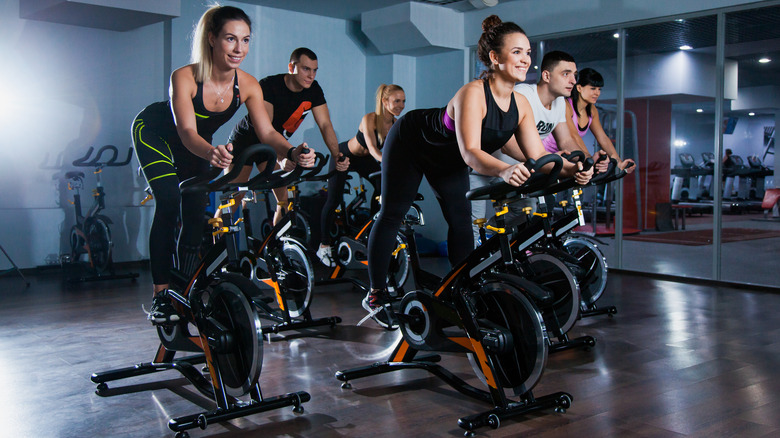Spinning Doesn't Burn As Many Calories As You Think
The spinning community continues to grow, largely due to the Peloton phenomenon, which combines the high-intensity exercise with entertainment and energetic instructors. According to Best Fit Magazine, people are obsessed with spinning largely due to the musical playlists, the instructors' personalities, and the upbeat attitude of the spin studio or online class.
The popular exercise is not only fun, but beneficial for your health. Research has found that spinning can support heart and lung health, as well as reduce stress while helping you shed pounds (via Backroads). At the end of a spin sesh, you may find yourself dripping with sweat and all of your energy spent. However, you may be surprised to learn that you didn't burn as many calories as you thought.
It's understandable that it might feel like you've burned an entire pizza (and dessert) worth of calories. After all, post spinning produces jelly legs and fatigue, but experts explain why this may not be the case.
Burn more calories by adding weight training
"An average spin class burns between 400 and 600 calories," fitness expert Will Torres told Redbook. "Spin three times a week and you torch up to 1,800 calories, but a pound of fat is equivalent to 3,500 calories. So to see weight-loss results, it's not realistic to allow for wiggle room."
Business Insider explains that during stationary spinning, as opposed to cycling, only the legs are being vigorously worked; there is little to no resistance. "You don't get near the calorie burn you would using a regular bike," trainer Cristy Nickel told Insider. She added that you can increase the number of calories burned by boosting the bike's tension and increasing speed.
To get the most out of your workouts and burn more calories, assistant fitness manager Amelia DiDomenico told Redbook that incorporating strength training into your fitness routine will yield better results. "Using weights will tone your muscles, making you look smaller... And the more muscle you have, the more efficient your body becomes, which means you'll burn more calories when resting," DiDomenico says.


